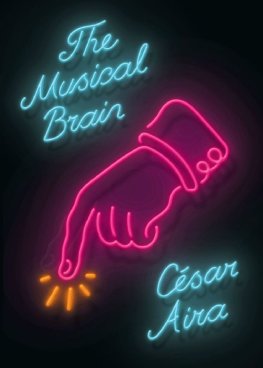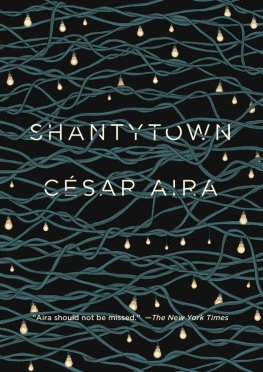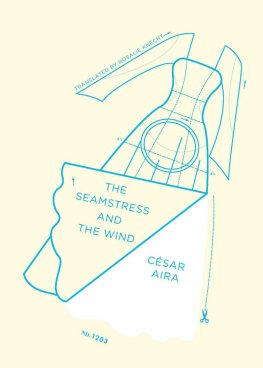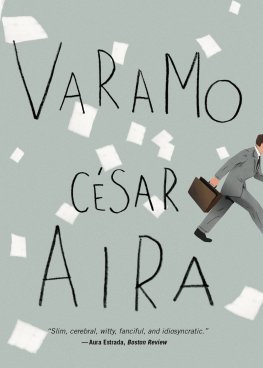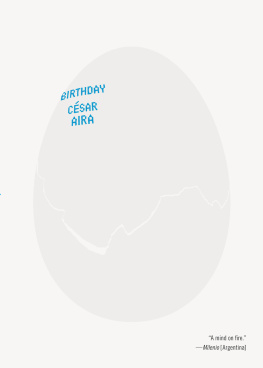Cesar Aira - Ghosts
Here you can read online Cesar Aira - Ghosts full text of the book (entire story) in english for free. Download pdf and epub, get meaning, cover and reviews about this ebook. City: 978-0-8112-1742-2, year: 2009, publisher: New Directions Publishing, genre: Prose. Description of the work, (preface) as well as reviews are available. Best literature library LitArk.com created for fans of good reading and offers a wide selection of genres:
Romance novel
Science fiction
Adventure
Detective
Science
History
Home and family
Prose
Art
Politics
Computer
Non-fiction
Religion
Business
Children
Humor
Choose a favorite category and find really read worthwhile books. Enjoy immersion in the world of imagination, feel the emotions of the characters or learn something new for yourself, make an fascinating discovery.
- Book:Ghosts
- Author:
- Publisher:New Directions Publishing
- Genre:
- Year:2009
- City:978-0-8112-1742-2
- Rating:5 / 5
- Favourites:Add to favourites
- Your mark:
- 100
- 1
- 2
- 3
- 4
- 5
Ghosts: summary, description and annotation
We offer to read an annotation, description, summary or preface (depends on what the author of the book "Ghosts" wrote himself). If you haven't found the necessary information about the book — write in the comments, we will try to find it.
Ghosts — read online for free the complete book (whole text) full work
Below is the text of the book, divided by pages. System saving the place of the last page read, allows you to conveniently read the book "Ghosts" online for free, without having to search again every time where you left off. Put a bookmark, and you can go to the page where you finished reading at any time.
Font size:
Interval:
Bookmark:
Csar Aira
Ghosts
ON THE MORNING of the 31st of December, the Pagaldays visited the apartment they already owned in the building under construction at 2161 Calle Jos Bonifacio, along with Bartolo Sacristn Olmedo, the landscape gardener they had hired to arrange plants on the two broad balconies, front and rear. They climbed the stairs littered with rubble to the middle level of the edifice: like the other apartments, the one they had acquired occupied a whole floor, the fourth. Apart from the Pagaldays there were only six other owners, all of whom made an appearance on that last morning of the year to see how the work was coming along. The builders were conspicuously busy. By eleven, there were people everywhere. It was in fact the day on which, according to the contracts, the apartments should have been ready to move into; but, as usual, there had been a delay. Felix Tello, the construction companys architect, must have gone up and down fifty times, allaying the owners concerns. Most had come with a tradesman of some kind: a carpet layer to measure the floors, a carpenter, a tiler, or an interior decorator. Sacristn Olmedo was talking about the dwarf palms that would be arranged in rows on the balconies, while the Pagalday children went running through rooms, which still had no flooring, doors or windows. The air conditioning units were being installed, ahead of the elevators, which would have to wait until after the holiday. Meanwhile materials were being hoisted up through the shafts. Perched on their high heels, the ladies were climbing the dusty stairs scattered with pieces of rubble; since the banisters had not yet been fitted, they had to be especially careful. The first basement level was to be used for garages, with ramps up to the street, which had not yet been covered with their special anti-slip surface. The second level was for box rooms and storage space. On top of the seventh floor, a heated swimming pool and a games room, with a panoramic view over rooftops and streets. And the caretakers apartment, which was no more finished than the rest of the building, but had been inhabited for some months by Ral Vias, the night watchman, and his family. Vias was a reliable Chilean builder, although he had turned out to be a prodigious drinker. The heat was supernatural. Looking down from the top was dangerous. The glass panels that would enclose the whole terrace were not yet in place. The visitors kept their children well away from the edges. Its true that buildings under construction seem smaller before the windows, doors and flooring have been put in. Everyone knows that; and yet somehow the opposite also seemed to be true. Domingo Fresno, the architect in charge of the interiors on the second floor, was walking anxiously through that capacious labyrinth, as if across the sands of a desert. Tello had done his job well enough. At least the building was standing firm on its foundations; it could have melted like an ice cream in the sun. No one had come to see the first floor. The Kahns, an older couple with two young daughters, were on the fifth floor with their decorator, the extraordinary Elida Gramajo, who was calculating aloud, working out the quantities of fabric required for drapes. Every detail had to be taken into account. And no detail could be specified without measuring both the space it would occupy and the surrounding space. Consequently, that big concrete cage was measured exhaustively, in three dimensions, millimeter by millimeter. A woman in violet was catching her breath on the stairs between the sixth and seventh floors. Others didnt have to make an effort: they floated up and down, even through the concrete slabs. The owners were not bothered by the delay, partly because they didnt have to make the last payment until they took possession, but also because they actually preferred to have a bit more time to organize the furnishings and fittings. The measurements were expanding the space that had been shrunken by illusion; similarly, the duration of the move was expanding. Besides, there would have been something violent about taking possession on the last day of the year. On the sixth floor, Dorotea and Josefina Itrbide Sans, two girls aged five and three, were kicking up cement dust with their little sandaled feet while their parents chatted placidly with Felix Tello. Tello excused himself to greet the woman in violet and accompanied her up to the next floor. They met the Kahns coming down from the games room and introduced themselves. Meanwhile the Pagaldays looked out from their balcony at the large plane trees growing in the Calle Bonifacio. Although not yet fitted with security grilles, the balconies with high balustrades were, for the moment, the safest place for children. It was a morning of high childishness. Everything belonged to the children. The expansion produced by the measurements and the feeling of contraction that goes with fear were overlaid by the world of childhood. The real universe is measured in millimeters, and it is gigantic. Where children are present, dimensions are always mediated, scaled down. The decorators were crafting miniatures. Besides, all these powerful people and this profitable business were operating for the benefit of the children; if not for them, the parents would have chosen to live in hotels. Horrible and half-naked, the builders came and went among them. The frontier between rich and poor, between human beings and beasts, was a line in time; the space occupied by one group would soon be taken over by the other. In spite of its symbolism, the 31st was a crude and obvious allusion to this state of affairs. It was also indisputably true that the poor had a right to be happy too, and could even exercise that right. The mediation between large and small sums of money is effected by use and especially the diversity of users; possession, on the other hand, is as transitory as the gathering that was taking place that morning on the building site. Fresno was planning to put as many plants inside as Olmedo was putting outside. In a way, they were all landscape gardeners. And indeed, for the time being, the whole site was outside. The building would be finished when it all became an inside. An intimate, armor-plated little universe. Felix Tello himself would vanish like a puff of dust blown away by the passing years. The children would grow up here, for a while at least. The Lpez family, who would occupy the first floor, had small children; they were in their square patio at the back, where the red paving stones had already been laid. The owners of the third floor, who arrived at midday, were the parents of the lady in violet who was going to live up on the seventh; they arrived with her children. There could hardly have been more children; each would have a private landscape, one on top of the other. Ms Gramajo had spent three hours taking notes, writing down figures extracted from space. Mrs De Itrbide said she had seen a horrible fat monster like a sumo wrestler. He was from Santiago del Estero. A tray with buckets on it was rising up the elevator shaft, hoisted by a little motor. Around one, as the owners were leaving, there was an impromptu meeting on the first floor, where it was cooler. From the top floor you could see into the yard of the police station, which was around the corner, on the Calle Bonorino. An old gentleman, the Lpezs cabinet maker, had measured various walls for bookshelves and cupboards. Since the owners had bought their apartments off a plan, they had all preferred to have their cupboards specially built. The construction company had suggested a firm of cabinet makers who were looking after four floors: their workshops would take orders directly from the decorators. Downstairs, while the parents were talking, various kids watched the workmen filling a big metal dumpster in the street with rubble. They were wheeling their barrows up a sloping plank that was blocking the sidewalk; women coming back from the supermarket on the corner with their trolleys full of provisions for the New Years Eve feast had to go onto the road, a manoeuvre they accomplished reluctantly. Domingo Fresno was talking with a bearded young architect, an acquaintance of his, who would be doing the interiors on the seventh floor. The moment for swinging into action was, they felt, dizzyingly imminent: although the building seemed utterly incomplete and provisional, with so much rubble and empty space, any day now it could be finished. Elida Gramajo, who had already left, was thinking the same thing. Less mindful of what lay ahead, the owners were thinking something else. But if anyone should have been imagining the disappearance of the builders, seeing them vanish into thin air, without a trace, like bubbles bursting soundlessly, it was them. The electricians stopped working at one on the dot, and left. Tello spoke for a moment with the foreman, then they went to look at the plans, which kept them busy for a good quarter of an hour. Putting in the wiring wouldnt take long at all; the power points and all the rest could be finished off in an afternoon. The parents of the lady in violet climbed up with the children to see the games room on top and the swimming pool, which was already lined with little sky-blue tiles. An extremely thin, badly dressed woman was hanging washing on a line, in what would be the patio of the caretakers apartment. It was Elisa Vicua, the night watchmans wife. The visitors looked up at the strange, irregular form of the water tank that crowned the edifice, and the big parabolic dish that would supply television images to all the floors. On the edge of the dish, a sharp metallic edge on which no bird would have dared to perch, three completely naked men were sitting, with their faces turned up to the midday sun; no one saw them, of course. On the fourth floor, the Pagaldays were leafing through the contents of a large oblong portfolio, listening to Sacristn Olmedos explanations. The children wanted to express their opinions too. Generally, though, what the children wanted was to look out from the balconies: wherever they came from, the difference in height was exciting. Even if they were moving from one third floor to another, there was a difference. What you could see from that height was different. The children were coming up with strange and sometimes illogical ideas about where they were. They resumed their races through the rooms, over the bare cement floors. Light penetrated to the farthest corner. It was as if they were in partitioned fields, raised to a certain height. After exchanging congratulations and best wishes for the year to come with a family that was about to leave, Felix Tello expressed his justifiable confidence that they would be happy in their new home.
Font size:
Interval:
Bookmark:
Similar books «Ghosts»
Look at similar books to Ghosts. We have selected literature similar in name and meaning in the hope of providing readers with more options to find new, interesting, not yet read works.
Discussion, reviews of the book Ghosts and just readers' own opinions. Leave your comments, write what you think about the work, its meaning or the main characters. Specify what exactly you liked and what you didn't like, and why you think so.


